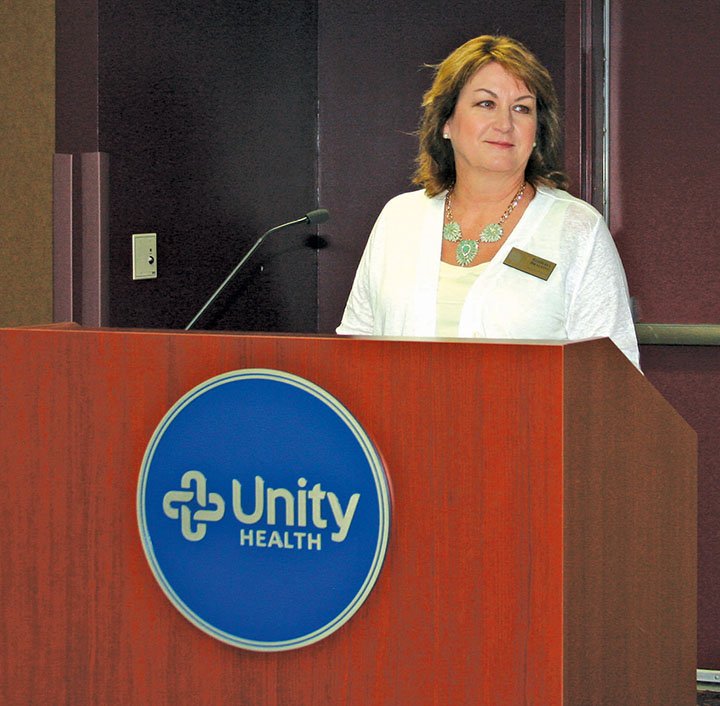SEARCY — In memory of a loved one, one Searcy organization is committed to spreading awareness of depression and suicide-prevention methods.
The Robert E. Elliott Foundation, named after a late physician who had depression and took his own life in 2001, presented the Understanding Depression Seminar on June 17 at Unity Health-White County Medical Center in Searcy. The organization founded in Elliott’s memory holds the yearly seminar to provide a six-hour training on ways health professionals, teachers, counselors and others can aid those with depression in their careers and lives.
“The main goal of the Elliott Foundation is to shine a light on the disease of depression,” said Kimberly Brackins, executive director. “We do that through any way we can find possible to educate the community. We also provide hope to families who have lost loved ones to suicide. Everything we do revolves around that.”
This year, seminar topics included antidepressants, depression among the elderly, treating depression in the geriatric community, ADHD (attention-deficit hyperactivity disorder), grief, and suicide risks among veterans. Topics were based on last year’s feedback and what past participants wanted to see in future years.
Brackins said 100 people registered for the seminar, and that’s the most amount of participants in recent years.
“It’s a great service in that they’re able to get six hours for $35 and not have to drive to Little Rock and pay sometimes $200 or $250,” she said, noting that some attendees traveled from Texarkana and West Memphis.
Brackins said the White County Community Foundation awarded the Elliott Foundation with a grant to help with this year’s seminar. Planning for the seminar began in January, and each presenter is a “well-qualified” speaker, Brackins said, including psychiatrist Ronald Wauters, medical director for behavioral health sciences at Unity Health. Wauters said depression is the most common mental illness, affecting 20 to 30 percent of the population — no matter the age or culture.
“The problem is that we suffer from our clinical term being used in the general population,” he said. “When people say they’re depressed because Arkansas lost yesterday, that doesn’t mean the same thing as what we’re talking about.”
Sadness isn’t necessarily depression, Wauters said. While sadness is brief, someone likely has the mood disorder “when you’re depressed more [often] than not for at least two weeks,” he said.
“It’s an illness that causes people not to be able to work, not to be able to function as mothers or fathers or do any of the things that they used to do,” he said. “It takes students out of school. It’s a very serious thing.”
Helen Barnes, a clinical social worker at the Eugene J. Towbin Healthcare Center in North Little Rock, attended the seminar to increase her skills because her work involves case-managing veterans who are mentally ill.
“The information that I have just increases my skill with how I can provide therapeutic treatment and discuss with our psychiatrists medications that we may be able to look at with our clients,” she said.
Barnes said the seminar helps decrease the stigma attached to depression.
“Ask for help. Don’t be afraid to ask for help,” she said. “There is someone there. Do not think that this is the end.”
Ten percent of those with depression commit suicide, said Wauters, who gave a Rethinking the Treatment of Depression in the Geriatric Population presentation at the seminar. Psychotherapy, counseling, medication and other methods can be used as treatment, he said.
Elliott Foundation board member Gerald Trammell said the stigma toward depression has decreased.
“I do know it’s improved because I lost my dad in 1971, and at the time, it just wasn’t talked about,” he said. “There weren’t organizations like we have now.”
Wauters said the first place someone should go if they are depressed is his or her primary-care doctor.
“That’s the best place to start because there’s more of them than us,” said Wauters, adding that visiting a pastor or counselor, or calling the suicide hot line at (800) 273-8255, can also help.
Marilyn Elliott, Robert’s widow who helped start the Elliott Foundation, said she’d advise others to encourage their loved ones to get help.
“Sometimes when you’re not well, it’s hard to take that next step,” she said.
Wauters said education is key to preventing suicides and spreading awareness.
“The more people know about depression, the less misconceptions there are, the more likelihood people will come and get help,” Wauters said. “The more people that know that help is available, that this is a treatable illness, the better.”
Staff writer Syd Hayman can be reached at (501) 244-4307 or shayman@arkansasonline.com.
